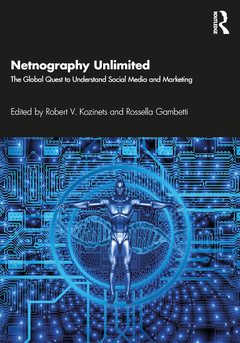Netnography Unlimited Understanding Technoculture using Qualitative Social Media Research
Coordonnateurs : Kozinets Robert V., Gambetti Rossella

Netnography has become an essential tool for qualitative research in the dynamic, complex, and conflicted worlds of contemporary technoculture. Shaped by academic fields, industries, national contexts, technologies and platforms, and languages and cultures for over two decades, netnography has impacted the research practices of scholars around the world.
In this volume, 34 researchers present 19 chapters that examine how they have adapted netnography and what those changes can teach us. Positioned for students and researchers in academic and professional fields, this book examines how we can better use netnographic research to understand the many ways networked technologies affect every element of contemporary business life and consumer existence.
Netnography Unlimited provides an unprecedented new look at netnography. From COVID-19 to influencer empathy, gambling and the Dark Web to public relations and the military, AI and more-than-human netnography to video-streaming and auto-netnography, there has never been a wider or deeper treatment of technocultural netnographic research in one volume. Readers will learn what kind of work they can do with netnography and gain an up-to-date understanding of the most pressing issues and opportunities. This book is a must-read for those interested in technology, research methods, and contemporary culture.
Section 1. Netnography mobilized. 1. Netnography today: a call to evolve, embrace, energize, and electrify (Robert V. Kozinets). 2. Netnography to uncover cryptomarkets (Alexia Maddox). 3. Netnography to explore gambling practices: situating and advancing discourse and method(Killian O’Leary). 4. In the public interest: netnography to impel policy and regulatory change (Robert V. Kozinets, Rossella Gambetti, Ulrike Gretzel, Maribel Suarez and Caroline Renzulli). Section 2. Netnography territorialized. 5. Netnography in the healthcare and nursing sector (Martin Salzmann-Erikson and Henrik Eriksson). 6. Netnography in a military context: ethical considerations (Donna Schuman, Donald Schuman, Natalie Pope and Amy Johnson). 7. Political netnography: a method for the study of power and ideology in social media (Dino Villegas). 8. Netnography in public relations (Margalit Toledano). 9. Netnography in tourism beyond Web 2.0: a critical assessment (Rokhshad Tavakoli and Paolo Mura). Section 3. Netnography industrialized. 10. Netnography applied: five key lessons learned from sixteen years of field experience (Michael Bartl and Constance Casper). 11. Netnography in the banking sector (José-Serafin Clemente-Ricolfe and Roberto Cervelló Royo). 12. The best of both worlds: methodological insights on combining human and AI labor in netnography (Anna Marchuk, Stefan Biel, Volker Bilgram and Signe Worning Løgstrup Jensen). 13. Global beautyscapes: an innovation-centered netnography of Chinese skin care and cosmetics consumers(Rossella Gambetti, Robert V. Kozinets, Ulrike Gretzel, Pierfranco Accardo and Luisella Bovera). Section 4. Netnography humanized. 14. Auto-netnography in education: unfettered and unshackled (Elizabeth Howard). 15. Getting up, close and personal with influencers: the promises and pitfalls of intimate netnography (Anthony Patterson and Rachel Ashman). Section 5 - Netnography theorized. 16. Netnography in human and non-human networked sociality (Sarah Quinton and Nina Reynolds). 17. Online ethnography and social phenomena on the move: time construction in netnography and mobile ethnography (Birgit Muskat). 18. Netnography in live video streaming (Yi-Sheng Wang). 19. Netnography, digital habitus, and technocultural capital (Rossella Gambetti).
Robert V. Kozinets is Professor and the Jayne and Hans Hufschmid Chair of Strategic Public Relations and Business Communication at the Annenberg School for Communication and Journalism and Marshall School of Business, University of Southern California, Los Angeles, CA, USA.
Rossella Gambetti is Associate Professor of Business Communication at Labcom (Research Lab on Business Communication) in the Department of Business Administration and Management Sciences, Università Cattolica del Sacro Cuore, Milan, Italy.
Date de parution : 12-2020
17.8x25.4 cm
Date de parution : 12-2020
17.8x25.4 cm
Thèmes de Netnography Unlimited :
Mots-clés :
English Premier League; Networked Sociability; Social Listening; Influencers; Netnographic Research; Innovation; GDPR; Global Beautyscapes; Social Media Content Creators; AI Labor; Netnographic Studies; Web 2.0; Social Bots; Public Relations; Netnographic Method; Social Media; Social Media Data; Ethical Considerations; LDA; Cryptomarkets; Netnographic Data; Technocultural netnographic research; Live Video Streaming; Video-streaming; Live Video Streams; Electrified sociality; Online Gambling; Auto-netnography; Human Researcher; Mobile Ethnography; Meetup Groups; Customer Complaint Behaviour; Political Ethnography; Online Poker; Deep Neural Network Model; Online Drug Markets; Public Relations Practitioners; Tobacco Free Kids; Online Teaching Practice



